新概念一lesson99-100 宾语从句
新概念英语第一册lesson99-100复习进程

He thinks that he needs an X-ray. 他认为他需要拍个X片。
可用在某些描写感情的形容词之后,如 afraid, sure, sorry, glad等:
Try and stand up. Can you stand up? Here . Let me help you. and 连接两个动词 上楼来看一看吧 Come upstairs and see it.
try to do …尽力,设法做… 我设法把他找出来 I try to find him out.
I think that I've hurt my back.
LUCY: Try and stand up. Can you stand up? Here. Let me help you.
ANDY: I'm sorry, Lucy. I'm afraid that I can't get up.
3 T: Does he think he's hurt his back? S:Yes, he does.
4 T: Can Andy stand up? S: No, he can't.
5 T: What does Lucy think? S:She thinks that the doctor had better
新概念英语第一册lessonup 起立,站起 来
help v. 帮助 at once 立即 sure adj. 一定的,确 信的
X-ray n. X光透视
99 课法 Grammar in use :
新概念英语1 lesson99-100知识点
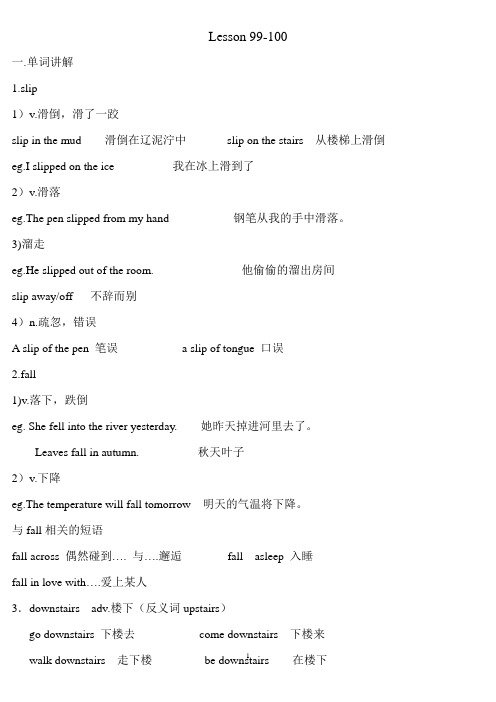
Lesson 99-100一.单词讲解1.slip1)v.滑倒,滑了一跤slip in the mud 滑倒在辽泥泞中slip on the stairs 从楼梯上滑倒eg.I slipped on the ice 我在冰上滑到了2)v.滑落eg.The pen slipped from my hand 钢笔从我的手中滑落。
3)溜走eg.He slipped out of the room. 他偷偷的溜出房间slip away/off 不辞而别4)n.疏忽,错误A slip of the pen 笔误 a slip of tongue 口误2.fall1)v.落下,跌倒eg. She fell into the river yesterday. 她昨天掉进河里去了。
Leaves fall in autumn. 秋天叶子2)v.下降eg.The temperature will fall tomorrow 明天的气温将下降。
与fall相关的短语fall across 偶然碰到…. 与….邂逅fall asleep 入睡fall in love with….爱上某人3.downstairs adv.楼下(反义词upstairs)go downstairs 下楼去come downstairs 下楼来1walk downstairs 走下楼be downstairs 在楼下5.hurt1)v.伤eg.It hurt my back. 它伤了我的背。
2)v. 伤害感情(心灵上或思想上的伤害)eg.I feel hurt . 我感到受了伤害3)v.疼痛eg.Does it hurt? 痛吗6.back1)n.背,背部lie on one’s back 面朝天地躺着/摔倒fall on one’s back 面朝天地躺着eg.I back hurts . 我的背部痛2)n.背面the back of hand 手背3)n.后面,后部eg.There are two students at the back of the classroom. 教室的后面有2名学生4)adv.在后,向后stand back 向后站回原处go back to …回到…. come back to….回来到….put these book back 把书放回原处7.stand up 起立,站起来sit down 坐下stand on one’s head 倒立stand on one’s own feet 独立,不依赖别人,自食其力stand behind 做…后盾,支持…. stand up to….经受住,勇敢面对stand well with 与…和睦相处8.help1)v.帮助2eg.Can I help you?(餐馆:您要吃点什么?商店:您要买点么?)We need your help. 我们需要您的帮助。
新概念英语第一册 第99-100课
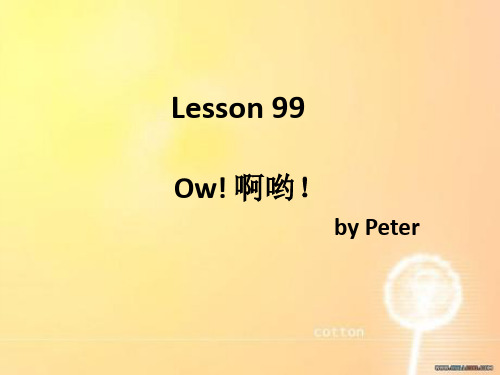
• 3)n. 后面,后部 • 教室的后面有2名学生。 • There are two students at the back of the classroom. • 4)adv. 在后,向后 • stand back 向后站 • 5)adv.回原处 • go back to… 回到… • 他要回到家乡去了。 • He will go back to his hometown. • 把书放回原处 • put these books back
• I'm sure (that) you need an X-ray. • =I’m sure (that) the doctor needs to X-ray your back. • 明天我要去做一个颈部的X光透视。 • I will X-ray my neck tomorrow.
翻译句子
• • • • • • • • •
--fall across 偶然碰到…,与… 邂逅 昨天他偶然碰见了他以前的女朋友。 He fell across his former girl friend yesterday. --fall asleep 入睡 他刚要睡着,门铃响了。 He is just falling asleep, The doorbell rang. --fall in love with… 爱上某人 她对他一见钟情。 She fell in love with him at the first sight.
• • • • •
downstairs adv. 楼下 反义词upstairs --go downstairs 下楼去 --be downstairs 在楼下 hurt 1) v. 伤
• 他的女儿从自行车上捽了下来,伤到了背部。 His daughter fell off the bike and hurt her back. • 2)v. 伤害感情 • I feel hurt. • 我感到受到了伤害。(尤指思想、心灵) • 3)v. 疼痛 • Does it hurt? 痛吗?
新概念英语第一册lesson99-100
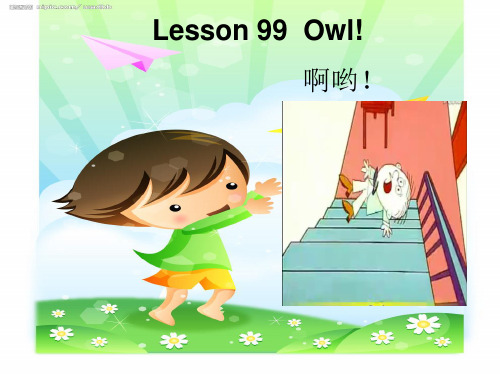
Comprehension:
Ask individual students questions. Students give natural answers 1 T: What did Andy do? S: He slipped and fell downstairs. 2 T: Has Andy hurt himself? S: Yes, he has. 3 T: Does he think he's hurt his back? S:Yes, he does.
Asking questions: Ask me if … 1 T: Andy slipped downstairs. S: Did Andy slip downstairs? T: How ⋯ ? S: How did Andy slip downstairs?
2 T: Ask me if Andy hurt himself. S: Did Andy hurt himself? T . How ⋯ ? S: How did Andy hurt himself?
Let’s have a test.
ቤተ መጻሕፍቲ ባይዱ
C 1. Are you interested in _____? A. how did he do it B. he did it how C. how he did it D. he how did it D 2. I don’t know _____. Can you tell me? A. how the two players are old B. how old are the two players C. the two players are how old D. how old the two players are 3. What did the scientist say? B He said he wondered if _____ into space by spaceship one day. A. he had to fly B. he could fly C. can he fly D. could he fly
新概念第一册Lesson99-100

★ hurt [hə:t] ( hurt, hurt) v.伤,伤害,疼痛 • 1) v. 伤 • Have you hurt yourself? • 你伤到自己了吗? • Does it hurt? 痛吗?
• • • • •
2)v. 伤害感情 (尤指思想、心灵) You hurt my heart. 你伤我心了 I feel hurt . 我感到受了伤害
LUCY:Have you hurt yourself? ANDY:Yes, I have. I think that I've hurt my back.
LUCY:Try and stand up. Can you stand up? Here. Let me help you
ANDY:I'm sorry, Lucy. I'm afraid that I can't get up.
• 5.从句中有or not时。 • I don’t know whether or not it rains.
宾语从句的分类:
• 1.作动词的宾语: • say, think, believe, hope, know, understand, suppose等 • Everyone knows that he is a good student. • 2.作介词的宾语: • This depends on how hard you work. • 3.作形容词的宾语: • 描写感情的形容词后,如afraid, sure, sorry,glad等 • They are afraid that they are wrong.
2.语序: 一定要使用陈述语序。 He knows what he should do next.
新概念一Lesson 99-100 (共54张PPT)
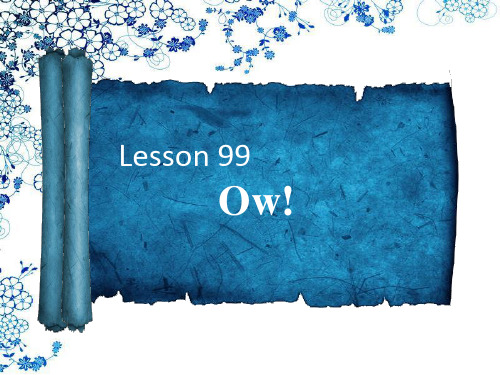
•我试着敲了敲后门,但没人回答。
•I tried knocking(knock) at the back door, but nobody answered.
Here. Let me help you.
•Here 在这里是感叹词,意思是“来”或 “喂”
•Let sb. do sth. 让某人做某事 •让他走。 •Let him go. •Let me help you = Let me give you a hand.
② = stand up 站起来
I think that the doctor had better see you.
•had better do sth. 最好… •你最好给你的妈妈打个电话。 •You’d better call your mother now. •我们现在最好回到车站去。(L95) •We had better go back to the station now.
She said “Ow”.
•Watch the video and answer questions:
1. What’s wrong with Andy? 2. Must Andy go to see the doctor?
Answer the two questions: 1. What’s wrong with Andy?
•slip away/ off 不辞而别 •她从舞会上偷偷地溜了出去。 •She slipped away from the party.
4)n. 疏忽,错误
a slip of the pen 笔误
口误 a slip of the tongue
What is the matter with Ruo Xi? She fell downstairs.
新概念课堂笔记 第一册 Lesson 99-100
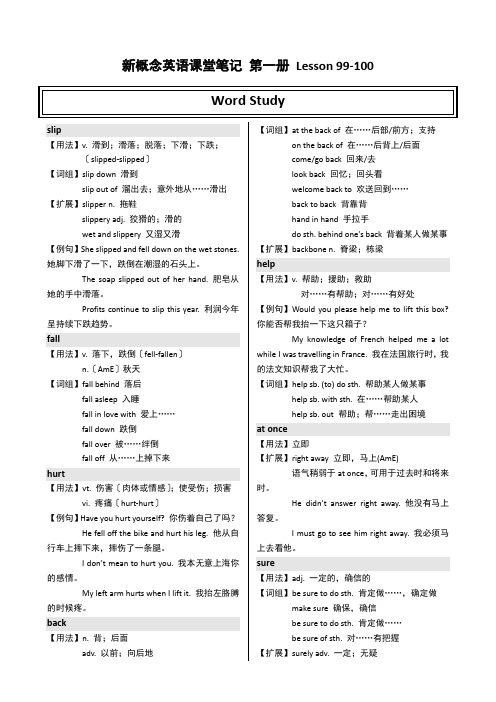
新概念英语课堂笔记第一册Lesson 99-100slip【用法】v. 滑到;滑落;脱落;下滑;下跌;〔slipped-slipped〕【词组】slip down 滑到slip out of 溜出去;意外地从……滑出【扩展】slipper n. 拖鞋slippery adj. 狡猾的;滑的wet and slippery 又湿又滑【例句】She slipped and fell down on the wet stones. 她脚下滑了一下,跌倒在潮湿的石头上。
The soap slipped out of her hand. 肥皂从她的手中滑落。
Profits continue to slip this year. 利润今年呈持续下跌趋势。
fall【用法】v. 落下,跌倒〔fell-fallen〕n.〔AmE〕秋天【词组】fall behind 落后fall asleep 入睡fall in love with 爱上……fall down 跌倒fall over 被……绊倒fall off 从……上掉下来hurt【用法】vt. 伤害〔肉体或情感〕;使受伤;损害vi. 疼痛〔hurt-hurt〕【例句】Have you hurt yourself? 你伤着自己了吗?He fell off the bike and hurt his leg. 他从自行车上摔下来,摔伤了一条腿。
I don’t mean to hurt you. 我本无意上海你的感情。
My left arm hurts when I lift it. 我抬左胳膊的时候疼。
back【用法】n. 背;后面adv. 以前;向后地【词组】at the back of 在……后部/前方;支持on the back of 在……后背上/后面come/go back 回来/去look back 回忆;回头看welcome back to 欢送回到……back to back 背靠背hand in hand 手拉手do sth. behind one’s back 背着某人做某事【扩展】backbone n. 脊梁;栋梁help【用法】v. 帮助;援助;救助对……有帮助;对……有好处【例句】Would you please help me to lift this box? 你能否帮我抬一下这只箱子?My knowledge of French helped me a lot while I was travelling in France. 我在法国旅行时,我的法文知识帮我了大忙。
新概念英语第1册第99-100课课重点语法

新概念英语第1册第99-100课课重点语法第99-100课的内容:一、重要句型或语法1、宾语从句1)用来作宾语的句子叫做宾语从句,如:I think that I've hurt my back. / I'm afraid that I can't stand up. / I'm sure that you need an X-ray.2)本课出现了特殊的宾语从句,即间接引语的内容。
所谓间接引语就是指被转述的话,如:The doctor says that he will come at once.2、半情态动词needneed既可以作情态动词(没有人称和时态的变化,后面直接跟动词原形),也可以作行为动词(有人称和时态的变化,后接to do)。
如:He need to go there at once. / He needs to go there at once.二、课文主要语言点What's the matter? I slipped and fell downstairs. 1)What's the matter?,常用来询问对方怎么了。
2)可提问学生为什么slip和fall要用一般过去时。
注意提醒学生识记slip和fall的过去式形式。
Have you hurt yourself? Yes, I have. 1)可提问学生为什么此处动词要用现在完成时。
2)hurt oneself,伤了自己。
I think that I've hurt my back. 1)I think that...,可参考教材第203页的表格,掌握常见的宾语从句的主动动词。
2)back,背部。
Try and stand up. Can you stand up?Here. Let me help.1)try在此表示试试。
2)here是一种呼语,相当于汉语里的“来”。
- 1、下载文档前请自行甄别文档内容的完整性,平台不提供额外的编辑、内容补充、找答案等附加服务。
- 2、"仅部分预览"的文档,不可在线预览部分如存在完整性等问题,可反馈申请退款(可完整预览的文档不适用该条件!)。
- 3、如文档侵犯您的权益,请联系客服反馈,我们会尽快为您处理(人工客服工作时间:9:00-18:30)。
Presentation
New words and expressions
ow [au] [au] int. 哎哟 slip [slip] [sli v. 滑倒, 滑倒,滑了一脚 v. fall [fɔ:l] [fɔ 落下 跌倒 [fe ['fɔ (fell [fel] , fallen ['fɔ:lən] ) downstairs ['daun'stεəz] adv. 下楼 ['daun'stε hurt [hə:t] ( hurt, hurt) v.伤,伤害,疼痛 [hə v.伤 伤害, back [bæ [bæk] n. 背 sure [ʃ [ʃuə] adj. 一定的,确信的 一定的, ['eks-rei] n. X光透视 ['eks- ei] X光透视 X-ray licence [‘ ais [‘laisəns] n. 执照 stand 站立 站起来 help at once 立刻 帮助
1.引导词:
原句如果是陈述句,变为宾语从句时要用that 原句如果是陈述句,变为宾语从句时要用that 引导, that无意义 仅起连接作用。 无意义, 引导,而that无意义,仅起连接作用。在口语 和非正式文体中常可省略 that. e.g. I think (that) you can do it. 一定要使用陈述语序。 陈述语序 2.语序: 一定要使用陈述语序。 e.g. He knows what he should do next.
1.whether引导的从句居于句首。 引导的从句居于句首。 引导的从句居于句首 Whether he agrees with me or not,I don’t know. 2.从句位于介词后作介词宾语。 从句位于介词后作介词宾语。 从句位于介词后作介词宾语 They are talking about whether he will come here. 3.whether在不定式前,与不定式组成词组。 在不定式前, 在不定式前 与不定式组成词组。 I don’t know whether to stay or go. 4.主句的位于动词是 主句的位于动词是discuss等动词。 等动词。 主句的位于动词是 等动词 They are discussing whether they should sell the old house.
巧学宾语从句口诀: 巧学宾语从句口诀:
宾语从句三注意,时态、语序、引导词。 宾语从句三注意,时态、语序、引导词。 主句若是过去时,主从时态要一致。 主句若是过去时,主从时态要一致。 宾从表达是真理,一般现在就可以。 宾从表达是真理,一般现在就可以。 引导词也不难,陈述可用that that连 引导词也不难,陈述可用that连。 一般问句表“是否” if、whether来引导 来引导。 一般问句表“是否”,if、whether来引导。 特殊问句作宾从,疑问词引导就能行。 特殊问句作宾从,疑问词引导就能行。 还有一点要说明,陈述语序要记清。 还有一点要说明,陈述语序要记清。
2.作介词的宾语: 作介词的宾语: 作介词的宾语 This depends on how hard you work. 3.作形容词的宾语: 作形容词的宾语: 作形容词的宾语 They are afraid that they are wrong. 描写感情的形容词后,如afraid, 描写感情的形容词后,如afraid, sure, sorry,glad等 sorry,glad等
5.从句中有 从句中有or not时。 从句中有 时 I don’t know whether or not it rains.
宾语从句的分类: 宾语从句的分类:
1.作动词的宾语: 作动词的宾语: 作动词的宾语 Everyone knows that he is a good student.
say, think, believe, hope, know, understand, suppose等 suppose等
7. I think that the doctor had better see you . You’d better =You had better ( do sth )
8. I ’ll phone Dr. Carter . Dr.=Doctor 医生,博士 医生,
Listen to the dialogue and pay attention to pronunciations and intonations,then ask and answer.
e.g. 他认为他需要拍个X片。 他认为他需要拍个X He thinks that he needs an X-ray. Xe.g. 我知道我能修理这部车。 我知道我能修理这部车。 I know that I can repair this car. e.g. 他们认为他们会有更多的钱。 他们认为他们会有更多的钱。 They believe that they will have more money. e.g. 她说她冷 She says that she is cold.
e.g.我觉得你需要拍个 e.g.我觉得你需要拍个X片。 我觉得你需要拍个X I am sure that you need an X-ray. Xe.g.听到你生病了我很难过。 e.g.听到你生病了我很难过。 听到你生病了我很难过 I am sorry that you are ill. e.g.你为我所做的一切我很满意。 e.g.你为我所做的一切我很满意。 你为我所做的一切我很满意 I’m very plesed with what you are doing.
I am afraid I can't help you.
我相信到那时一切都会更美好。 我相信到那时一切都会更美好。
I'm sure that everything will be better by then.
6.I can’t get up . can’ get up 站起来 =stand up 还可表"起床" 还可表"起床"。
的3个问题:
1.形式宾语it:如宾语从句后有补语, 1.形式宾语it:如宾语从句后有补语,要用形 形式宾语it 式宾语it来代替,而将从句放到补语的后面去。 it来代替 式宾语it来代替,而将从句放到补语的后面去。 e.g. He has made it clear that the meeting will not be hold. 2. 宾语从句否定意义的转移:在think、believe、 宾语从句否定意义的转移: think、believe、 suppose、except等后的宾语中 等后的宾语中, suppose、except等后的宾语中,如从句谓语是 否定的,一般将not移至主句谓语, not移至主句谓语 否定的,一般将not移至主句谓语,而将从句宾语变 为肯定形式。 否定前移。 为肯定形式。即:否定前移。 我想他没时间玩足球。 e.g. 我想他没时间玩足球。 I think that he doesn’t have time to play football. I don’t think that he has time to play football.
4. Let me help you . let sb. do sth. 5.be afraid that 想,恐怕 be sure that 想,认为 这两个结构后面通常接从句, 这两个结构后面通常接从句,在口语中 有时that可省略 可省略。 有时that可省略。 恐怕我帮不了你。 恐怕我帮不了你。
Language points
1. What’s the matter ? What’ = What’s wrong ? What’ = What’s the trouble ? What’ 2. I slipped and fell downstairs. fall downstairs 从楼梯上摔下来 3. here 让我来帮你) 来,喂( 让我来帮你) 感叹词,用来引起注意。 感叹词,用来引起注意。
3.反意疑问句:宾语从句的主句是主语+think 3.反意疑问句:宾语从句的主句是主语+think 反意疑问句 (except,suppose,believe,imagine)时, (except,suppose,believe,imagine)时 附加疑问句部分要根据主句的主语而定: 附加疑问句部分要根据主句的主语而定:当主语 是第一人称时,要根据从句而定;主语是第二、 是第一人称时,要根据从句而定;主语是第二、 三人称时,与主句保持一致,并且要注意否定前移。 三人称时,与主句保持一致,并且要注意否定前移。 is he e.g. I don’t think he is serious,________? You believe she is a good teacher, don’t you ________?
Lessons 99 Ow !
Warming up
Leading in
T : What Jim's trouble is here. He was trying to tell me what Kate meant but he cold not make it clear. And often it causes some embarrassments. To deal with the problem, we’d we’ better refer to lesson 99,which we are to learn.
3. 时态:
主句一般现在时,从句据句意用各种时态。 主句一般现在时,从句据句意用各种时态。 一般现在时 各种时态 主句一般过去时 从句只能用相应的过去时态 一般过去时, 相应的过去时态。 主句一般过去时,从句只能用相应的过去时态。 如宾语从句所陈述的内容是客观真理 客观事实, 客观真理, 如宾语从句所陈述的内容是客观真理,客观事实, 自然现象或定理等,则用一般现在时 一般现在时。 自然现象或定理等,则用一般现在时。 e.g. Everyone thinks (that)Milke will win the game. I thought (that )he watched the match. The teacher said (that) the earth goes around the sun.
